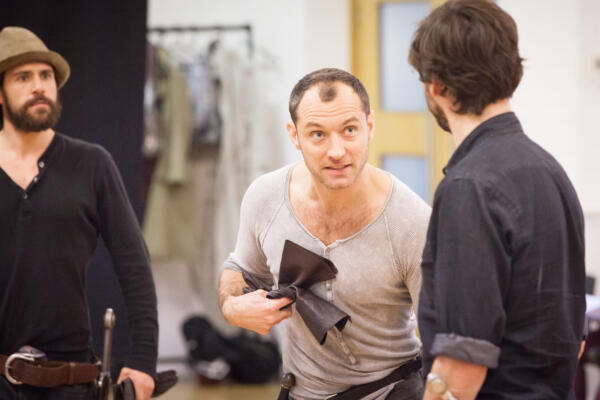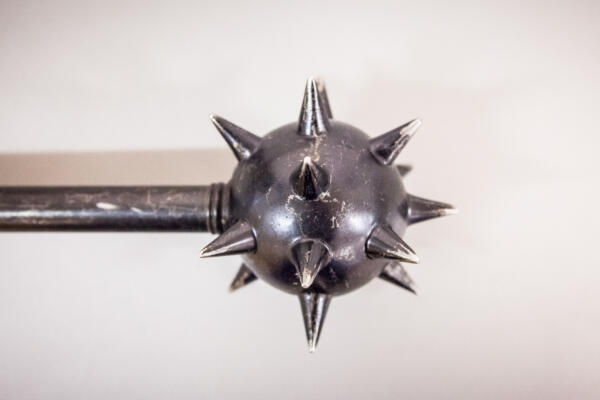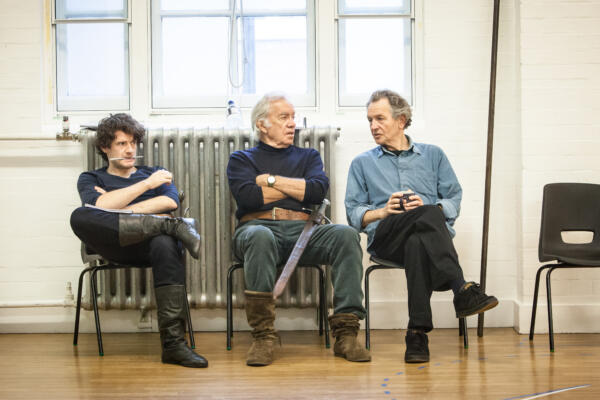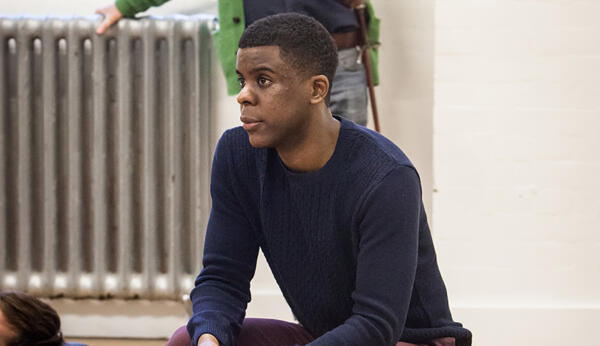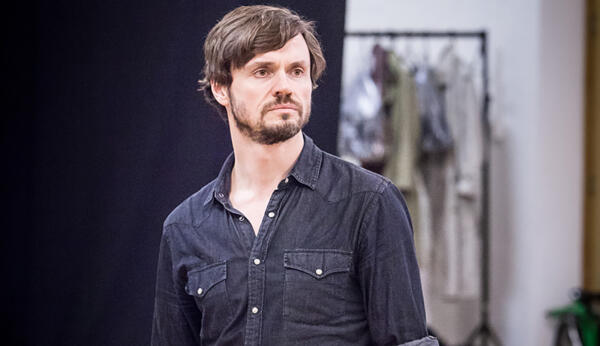Henry V | Inside the Rehearsal Room
Henry V– Week One, Day Three
In today’s rehearsal the action has shifted from the English to the French court. Scene Fourteen is a duologue between Katherine, daughter of the King of France, played by Jessie Buckley, and Alice, her lady-in-waiting, played by Noma Dumezweni, in which Alice attempts to teach Katherine English.
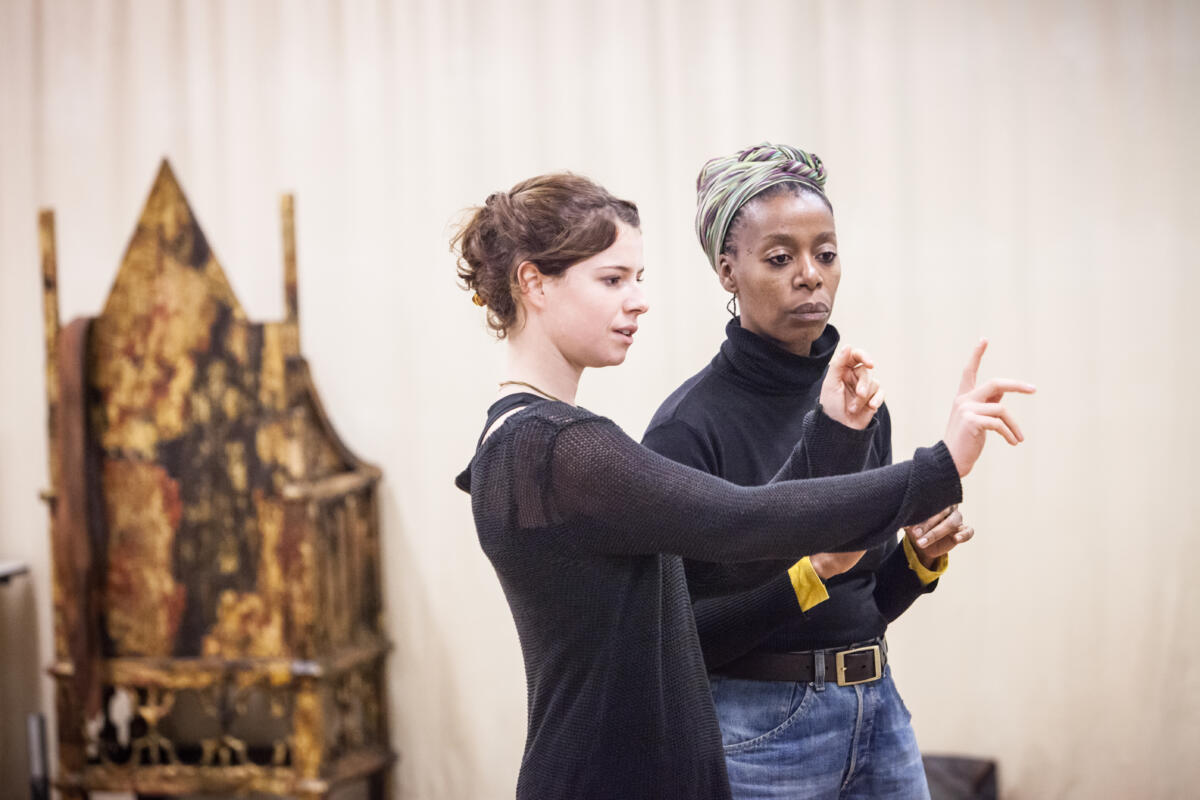
Richard Clifford, who plays Charles, King of France, is also present as he’s a fluent French speaker. He will record both Katherine and Alice’s lines so that Jessie and Noma can listen back to them in order to check the pronunciation. Richard comments that the English court would, in fact, have been able to speak French.
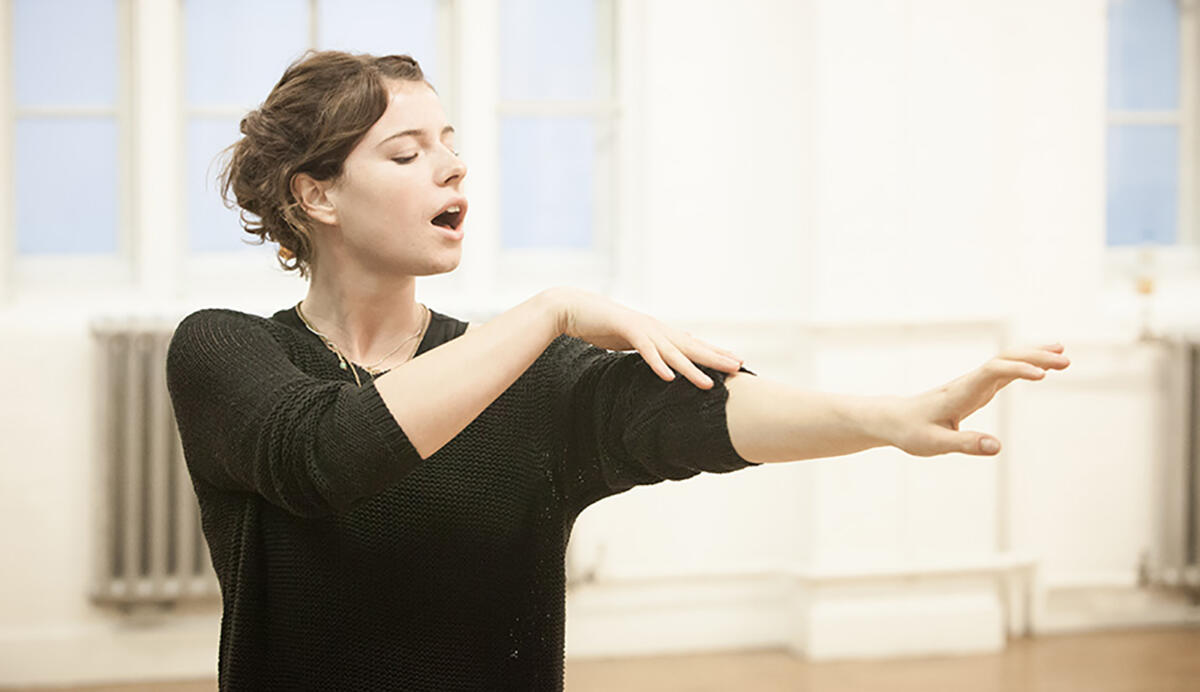
Work begins by translating all of the lines. Some key words require specific pronunciation – for example, ‘fingres’ (fingers) as ‘fangrers’. Michael describes this as a ‘four hundred-year-old joke’: ‘The ones in the audience who do know the words act as a contagion for the others, bringing them into it.’
He questions the tone of the scene, referring to its ‘lightness’. He describes this scene as bridging the ones before and after. ‘It discombobulates an audience – from a male, war-torn world to two women.’ Jessie wonders how aware Katherine is of the current political situation? She suggests she knows she’s being ransomed, hence the English lesson. ‘We, the audience, should know the context of this scene,’ reflects Michael. Jessie thinks Katherine sees the ‘union’ between her and Henry as an opportunity to get away from her family.
Michael and the actors then consider the setting. ‘I like the idea of this almost being a walk in the gardens, rather than an interior scene,’ says Michael. ‘It gives us an opportunity to flood the stage after the battles and bloodshed. The one thing we haven’t had yet, literally or metaphorically, is sunlight.’ There’s the suggestion of adding birdsong to the soundscape.
They run the scene, following which Michael comments: ‘That’s in a very good place already’. He looks at some specifics. ‘I think I want to encourage you to be more adventurous with “nails”.‘ He’s keen to explore a version of the scene – ‘if only to cross it off’ – in which Katherine is more embarrassed than amused by the translation, possibly even shocked.
The actors run the scene again. ‘You used the space almost pitch-perfect,’ says Michael afterwards. ‘You somehow managed to find the bulk of the scene in the centre of the space. There was a real sense of you coming from somewhere, going to somewhere, and that this was just a place you were passing through. You weren’t walking on, doing the scene, then walking off.’
Rehearsals continue with the next scene, fifteen, in which the French king holds an emergency council of war and, it’s suggested, ‘psyches himself up’. Michael asks Richard: ‘What has happened since we, the audience, last saw you?’ The defeat at Harfleur is discussed, including the notion that the Dauphin is characterised as having failed France. This leads to questions about key events: Historically, was the Dauphin at Agincourt? These can usually be answered by Russell Jackson, otherwise Associate Director Lisa Blair will do further research.
Michael wants to try Scene Fifteen starting immediately after the previous one: ‘Do we have a moment where Katherine exits, laughing, and almost collides with her father? In most productions, this encounter wouldn’t happen.’ He encourages Richard and Jessie to ensure all the nuances of this moment, with Katherine ultimately headed for Henry, are played out before the audience – ‘Make sure whatever happens, it’s on stage.’ Ben Lloyd-Hughes, playing the Dauphin, highlights the fact that Katherine is also his sister, which adds another element to this encounter.
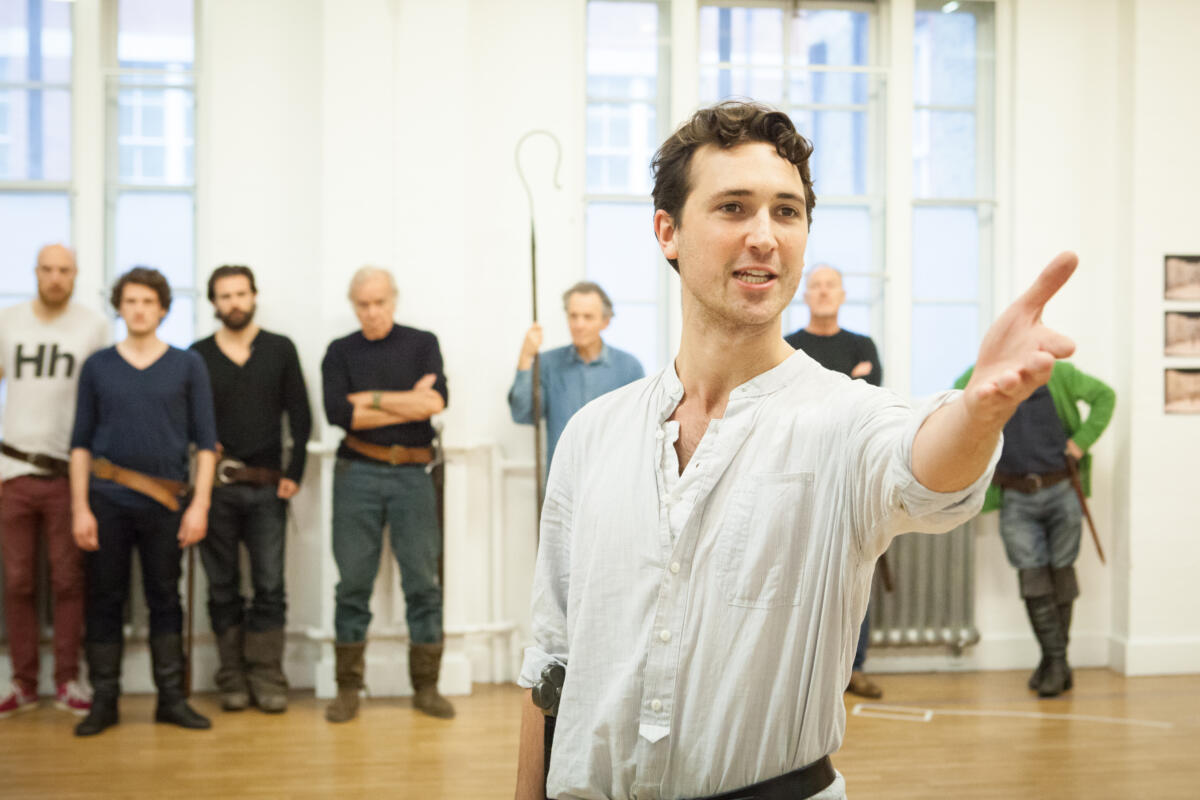
In this scene, says Michael, the audience ‘are invited to watch the French war machine and witness their incompetence’. He considers the scale of this and the previous scenes set in the French court: ‘I think there might be more to play with a smaller version. For our audience, it’s a nice shorthand for returning to the French council of war.’ Michael wants the actors to find the scene for themselves before adding other elements to it: ‘Bring us to your council of war and we will find the lighting for it.’
He particularly likes the setting. ‘It’s a nice juxtaposition – a war council that takes place in a garden.’ Reference is made to American presidents talking in the Rose Garden at the White House when they don’t want to be overheard, and Russell reminds everyone that the War of the Roses cycle of plays begin with a scene set in a garden. Michael thinks the outdoor setting gives Charles a better arc – ‘You’re not starting declamatory in a chamber.’ He asks the actors to help the audience: ‘You need to do something in your minds to tell us we’re in the same place as the previous scene.’
As ever, Michael maintains the balance between discussing story and characters and focusing on the practicalities of blocking. ‘Come down the centre,’ he suggests to one actor. ‘Would it help you if one of the others came downstage so you could do the line on the diagonal?’ He works with Richard to find the journey of Charles’ speech: ‘Ask the question “Where is Montjoy the herald?” and then build.’
Michael will often say of scenes ‘there’s a version where…’ and consider an alternative, always thinking about the clarity of the storytelling for the audience – ‘Help us’. At the end of the session, he comments to the actors: ‘You’re in a good place there, investing the lines with real thought and feeling.’
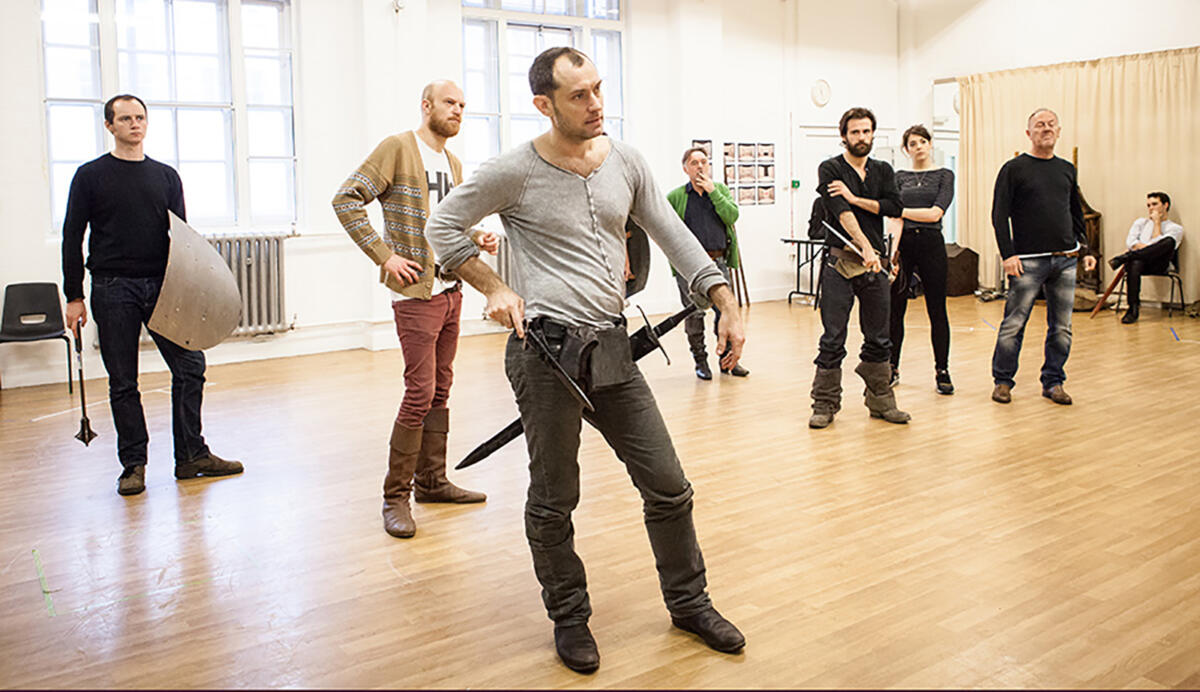
Michael then moves on to Scene Sixteen, the last one before the interval in this production, in which we see an exhausted Henry and his army much in need of rest. ‘This is rather a large scene in terms of what it explores,’ he observes. ‘It’s also, potentially, quite a lazy one for a director because it never defines itself as a place. We need to know where we are – we’re not just coming on to play a scene.’ Michael considers the fundamentals: ‘What’s the most important function of this scene? To show how ramshackle the British army are. If anything, we want this to be England rusting in the rain – the rain, the rust, the shit, the mire.’ Other elements of production can support this interpretation. ‘We can establish the feeling of rain,’ says Adam.
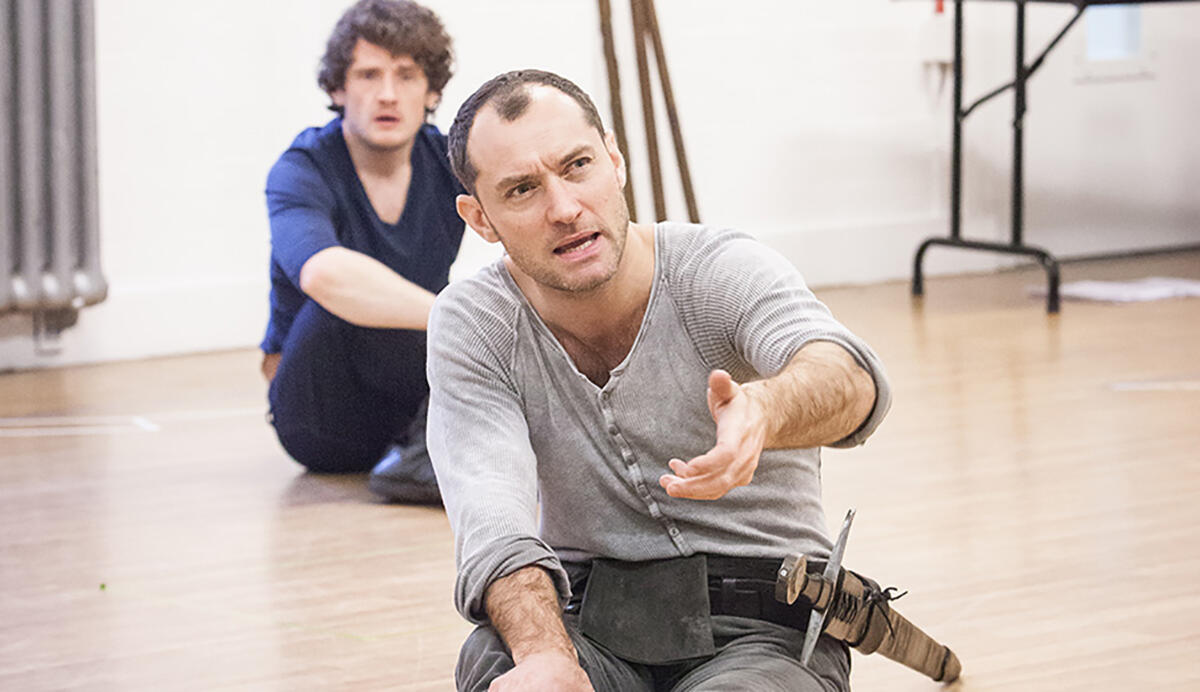
‘It’s the first time Henry’s down at heel,’ comments Jude. ‘There’s a sense of passing on the road, of real movement in this scene.’ Michael summarises it as the ‘English in transit’: ‘The movement contrasts nicely with the English being camped, being stationary, in the next scene.’ He discusses ‘traffic’ across the stage with Movement Director Michael Ashcroft, telling DSM Rhiannon Harper which extra ‘bodies’ he wants to call to the next rehearsal. Michael (Ashcroft) suggests having all of the doors open and a discussion about the lighting concludes that it should be low – ‘Head-height only’.
Working through the scene, Michael asks Harry Atwell, playing Gower, to clarify the setting: ‘Just to help locate us, when you say “the bridge”, remind me which bridge we’re talking about.’ Its strategic significance is discussed. ‘Winning the bridge means they can camp,’ says Michael Hadley (Canterbury). Jude adds to this: ‘It also means they can cross the river.’
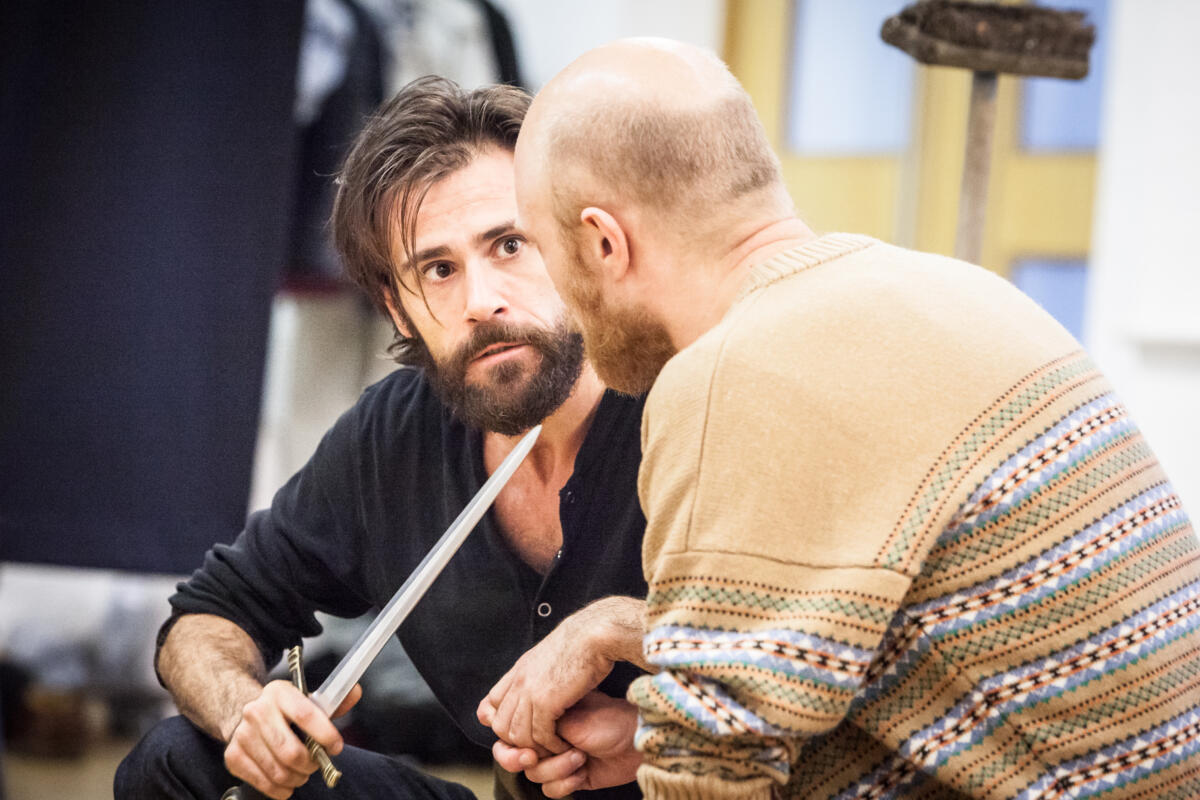
Michael questions Ron Cook, as Pistol, and Matt Ryan, playing Fluellen, about the interpretation of their initial exchange: ‘Tonally, are you sure that’s not quite a touching moment when you both talk of Bardolph?’ While being aware of the fatigue the characters are experiencing, Michael warns the actors against this becoming the dominant factor. ‘There’s a lack of engagement to do with being tired, but in that moment they do connect.’ Jude reflects on the impact on Henry of giving the order to execute his old friend, Bardolph, for stealing: ‘There’s a moment where it costs him, killing one of his own men.’
In Michael’s production the function of the messenger has been given to the French ambassador, Montjoy. It’s agreed that he arrives at a low point for the British army, with Henry, in Jude’s description, ‘down at heel’. ‘We never know what Montjoy thinks of his duty,’ reflects Michael. It’s noted that he distances himself from his message more than, for example, Exeter does. Jude is keen to discuss Henry and Montjoy’s relationship, suggesting he regards Montjoy well: ‘It’s another grace note of Henry being a gentleman.’ Of Henry’s admission of his army’s weakness, Adam Cork wonders if he’s simply lulling France into a false sense of security – ‘Is he playing possum?’
‘Through admission of weakness, Henry grows in strength,’ says Jude. In doing so, suggests Michael, he rallies his mind: ‘Henry gains confidence through his speech. Through self-awareness and self-confession, you arrive at where you are – you transform yourself. You go on a personal journey through self-knowledge to arrive at something yourself.’ Russell adds a further observation about Henry’s speech: ‘You go from “I” to “we”.‘ Reflecting on it afterwards, Jude comments: ‘I need to figure out a few of those direct commands.’ Michael reassures him – ‘There’s definitely a whole heap of colours there.’
They get to the end of the scene. ‘The reason I like this place for an interval is it’s a wonderful cliffhanger,’ says Michael. Jude agrees: ‘It’s a real, “What’s he going to do?” moment.’ Michael is pleased with the progress they’ve made today, saying to the cast: ‘Write down what you did there because it was naturally very beautiful. There was a lot of good storytelling.’
